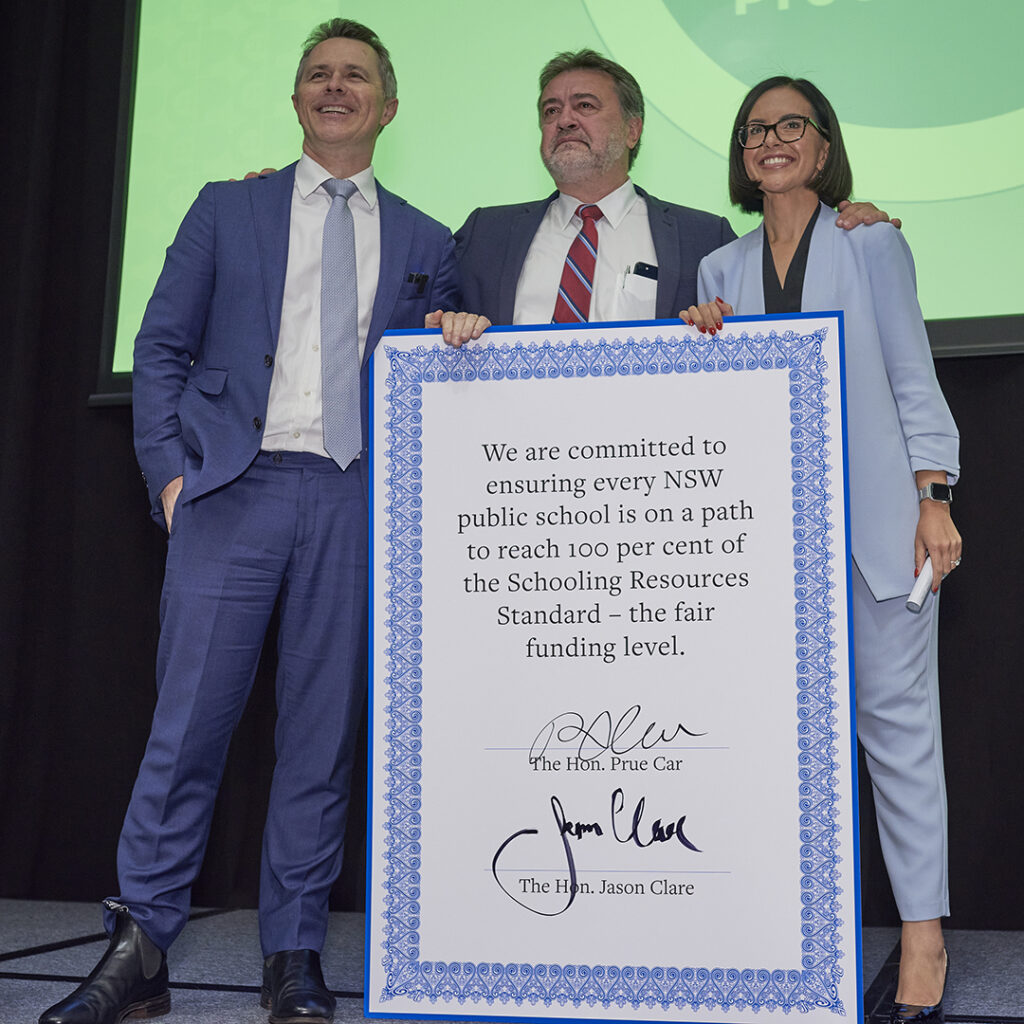
The NSW and federal education ministers today signed a pledge to commit to funding public schools to meet the minimum funding required for the educational needs of students, witnessed by principal members of the union.
State Minister Prue Car and federal counterpart Jason Clare signed the oversized “deed of trust” during Federation’s annual Principals’ Conference, where the MPs addressed attendees from across the state.
The document states: “We are committed to ensuring every NSW public school is on a path to reach 100 per cent of the Schooling Resource Standard – the fair funding level.”
The Schooling Resource Standard – a funding benchmark to meet students’ needs – was recommended in the Gonski Inquiry report back in 2011. However, Coalition governments shifted away from the direction of the original National School Reform Agreement (NSRA), the funding agreement between the federal and NSW governments, and slowed the pace of public schools reaching the 100 per cent benchmark. The shortfall should never have been an issue but for the Coalition’s policy.
Federation President Angelo Gavrielatos said: “We’ve been around for a while and seen a few these (NSRAs) and they haven’t gone the way they should have gone,” he said. “I think both of you should sign this in front of our principals as witness to this commitment by the state and federal minister to finally get the job done to give our schools, our kids, the funding they need, the funding they deserve.”
Principal classifications
Minister Car reconfirmed for the 260 principals in attendance, her decision of yesterday (4 May), about principal classifications, which she emphasised had been reached through “negotiation and open dialogue” with Federation.
“Currently, if the school classification falls due to enrolments or complexity loadings, as you know, the principal is required to move to a school that matches their existing pay classification or remain at the school on a lower pay grade,” Ms Car said. “This can be because school enrolments are falling due to a principal enforcing departmental policy on out of area enrolments. They’re effectively financially punished for doing what the Department is asking you to do. So, principals have to choose between the relationships you have established within school communities, and pay. This has got to stop.”
“Yesterday, I determined that no principal will be worse off if a school is reclassified,” Ms Car said. “Any principal who choses to remain at a reclassified school will be placed on salary maintenance until they move on from the position. “
“This is the practical benefit of negotiation and open dialogue. Where simple solutions are actually available, we can fix them quickly. Good faith negotiation builds results. We’ve only just begun.”
Better, fairer education system
Mr Clare told the conference, “I think we’ve got the best education system in the world; but not for everyone”, to introduce the work of an expert panel that will examine key targets and specific reforms that should be tied to funding in the next National School Reform Agreement.
He said data contained in the Productivity Commission report earlier this year – such as a fall in school completion rates from 76 per cent to 74 per cent for low socio-economic status (SES) schools compared with an increase from 83 to 85 per cent for high SES schools – highlighted an education gap in “blistering detail”.
“This is what we’ve got to fix,” he said. “Getting every school to what David Gonski called the Schooling Resource Standard … it’s critical. But what’s even more important is what that funding does and the difference that it ultimately makes to these children.
“That’s what the work of the Expert Panel … is all about. Making sure we tie funding to the things that really make a difference, ergo help to close this gap.”